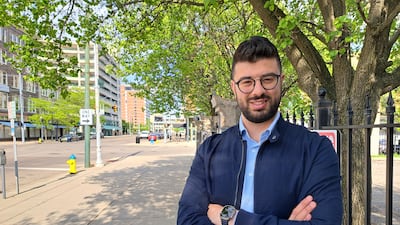It has been 10 years since Lebanese native Youssef Farhat arrived in the US as an undergraduate student at the University of Dayton, located in an Ohio city that has faced issues not entirely dissimilar to those of his home country.
But now, it’s time for a change.
Mr Farhat, originally from the Zgharta district in northern Lebanon, was recently appointed executive director of New York University's Centre for Human Rights and Global Justice.
The centre's work in 35 countries with experts including UN special rapporteur Margaret Satterthwaite and environmental legal scholar Cesar Rodriguez-Garavito inspired Mr Farhat to make the move.
“This is the environment that attracts me along with my background, growing up in Lebanon and witnessing a lot of injustices there,” he says. “I feel like I bring a bit of that to the table based on my experiences.”
For the past decade, Mr Farhat has watched from afar as uprisings in the Middle East and North Africa blossomed then faltered. He has also watched Lebanon plummet into a historic economic crisis.
Studying and then lecturing in Dayton, a city that has lost close to half its population since the 1960s, has offered him a window into human rights issues and other struggles facing a community in the heart of the world’s wealthiest country.
Pointing to the American heartland's raging opioid epidemic and high poverty rates, he points out that human rights issues are not confined to the Global South.
“People who are struggling with post-reconstruction in places like Lebanon can relate to the struggles of communities in Ohio,” he says.
Some of those similarities became more apparent during a trip to Lebanon last year.
“Visits home are getting increasingly harder. I never thought I’d see people waiting in line for bread or not being able to find or afford medication,” he says.
A collapsing currency, political ineptitude and corruption have led the country to near ruin in recent years. A report published by Human Rights Watch in December found that 90 per cent of Lebanese households are surviving on less than $377 per month.
“The high levels of inequality due to failed states and people’s inability to have agency over their own lives, these are the biggest issues facing the Middle East,” he says.

Despite a declining trust in institutions, growing inequality and a deepening global climate crisis, behind the scenes, important progress has been made in bettering people’s lives.
That is in large part due to actors and voices from non-western countries increasingly driving development and human rights efforts, securing seats at decision-making tables that for decades had been dominated by European and North American perspectives.
With Cop28 taking place in Dubai this November and December, climate and human rights issues will be on the minds of leaders across the Middle East.
NYU Abu Dhabi, which opened in 2010 and as about 2,200 students, currently heads the Universities Climate Network, a group of educational institutions in the UAE that is preparing workshops and other Cop28-related events across the country in the lead-up to the summit.
This participatory environment is one that has been fostered at Mr Farhat’s new professional home, the Centre for Human Rights and Global Justice, where scholars from around the world work on pressing rights issues under the assumption that positive change is possible.
“We have to be hopeful. There’s a growing movement around human rights advocacy that puts hope at the centre of communications around human rights issues,” says Mr Farhat.
“It’s easier to frame the human rights narrative through violations and a negative lens [but] there is absolutely inspiring and significant work taking place at the frontiers – and we get to be part of it at NYU.”

